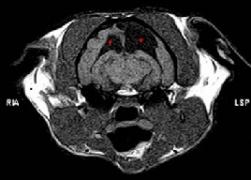New Treatments for Pets on the Horizon

New Treatments for Pets on the Horizon
Most people know the United States Food and Drug Administration (FDA) is charged with approving prescription drugs for people and all types of animals. What would surprise many pet owners is the limited number of approved drugs available for pets. Many of the drugs used by veterinary specialists are human drugs that have been repurposed for use in pets. This is not always ideal for us veterinarians. Having medications specifically approved for dogs and cats gives me greater assurance that medication is well absorbed by the pet, the distribution within the body is known and expected efficacy has been scientifically studied. Given the limited number of approved veterinary-specific medications, I am always happy to see an announcement of new animal drug approvals which improve my ability to care for my patients. Here are some recently approved drugs of interest to dog and cat owners.
New Medication for Canine Seizures
Seizures are one of the most common neurological disorders in dogs. Veterinary neurologists use medication that slow down the brain’s activity to prevent seizures. One recently approved drug decreases the frequency of seizures in dogs and is the first FDA-approved drug for this indication. The compound in the new product is potassium bromide, which has been used for year by veterinarians to control seizures. The new product is a chewable medication for dogs which makes the product very convenient for dog owners.
Pills to Treat Low Thyroid Levels
Hypothyroidism, or low levels of the hormone produced by the thyroid gland, leads to anemia, low energy, weight loss and skin problems. Hypothyroidism is the most common hormone disorder in dogs. Because the disorder is common, it is not at all surprising to read of a drug approved to replace this missing hormone. Human thyroid pills do not come in the correct sizes for dogs. Thus, dogs need their own thyroid pills to be treated successfully. These new pills come in nine different sizes to treat dogs from Chihuahua to Irish Wolfhound.
Two New Cancer Drugs for Dogs
Recent FDA approvals have doubled the number of chemotherapy drugs for dogs! Most importantly, the drugs treat two common cancers in dogs: mast cell tumor and lymphoma.
Tigilano tiglate is purified from an Australian rainforest plant, Fontainea picrosperma, or the blushwood tree, and is injected into the mast cell tumor on the skin unlike other chemotherapy drugs, which are administered orally or intravenously. Tigilano tiglate causes tumor cell death, leaving behind a defect in the skin which heals on its own over the next month. The company reports a 75% complete remission rate with one injection.
Verdinexor tablets shrink the enlarged lymph nodes that are the hallmark of lymphoma in dogs. Lymphoma is the most common tumor the AMC Oncology Service treats with chemotherapy. More treatment options for this disease are always welcome. Verdinexor is not yet available, but when it is, we will likely add it to our pharmacopeia.
The approval of new drugs is a continuous process which helps veterinarians do what they do best, keep your pet in the best health possible by using the best treatments available.






























